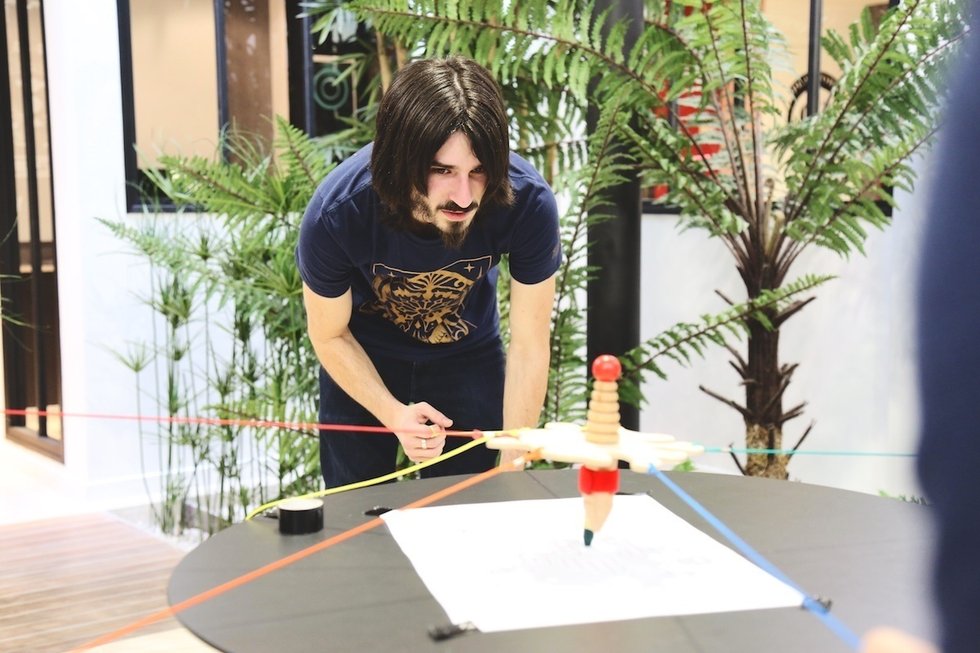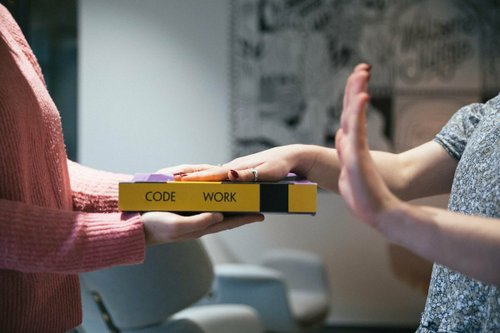Work and play: the growing trend of “recruitainment”
Apr 01, 2019
6 mins

CN
Fondatrice de Dea Dia
Recruitainment—that’s the combination of the words “recruitment” and “entertainment”—is a new method that’s bringing a bit of fun to the recruitment process. It’s a trend that has been emerging over the past few years and is about selecting people for jobs in a different way, in a more successful way. So what exactly is it and how can it be best used?
To understand the challenges of this new way of recruiting, we met with Pauline Garric, human alchemist and human resources coach at beNext, an innovative company that shows candidates’ potential using gamification as part of the recruitment process.
What’s the point of recruitainment?
Traditionally, recruitment has not been something to approach lightly. For companies, it’s a real challenge, because recruitment done badly can have terrible consequences. For candidates, interviews are often a source of stress, leaving them feeling overwhelmed by coming under such scrutiny and fearing eternal unemployment.
Although recruitment is definitely not fun and games, recruitainment is leading to a shift in the way the age-old image of taking on employees is perceived, creating a positive link between the company and candidates through play. This can take on different forms, including innovation competitions, video games, serious games, virtual interviews, escape-room games, poker tournaments, and strategy games.
For candidates the point is clear: playing is significantly more enjoyable than submitting oneself to a barrage of often-stressful questions. For companies, it’s all about attracting young recruits by seeming like a fun place to work. Used intelligently, recruitainment can also play a role in freshening up a company’s image, as well as helping to reduce the stress of an interview scenario.
There are several ways to picture recruitainment. For many, it’s a way of creating a relationship between the candidate and recruiter, bonding them through humor and playfulness before moving on to the more serious stuff: the traditional interview, where the resume and cover letter are scrutinized. For Garric, if things were just left at that, it wouldn’t count for much and, when used wisely, play can completely replace the traditional interview. She believes we learn a lot more about a candidate through games, even ones that seem basic, rather than through traditional questioning based on a resume.
Letting go of resumes means you’ll more easily be able to…
… identify potential
Resumes give some background on a candidate, but they don’t demonstrate their potential. Indeed, just because that person has undertaken a particular job previously doesn’t mean that they were the right fit for it. Equally, having never previously undertaken a similar position in the past doesn’t mean that the person won’t meet all the specifications of the job. Picking up a candidate’s strategic qualities solely from their resume is no easy task. On the other hand, doing it through play is a lot easier. “Clinging solely to a resume for information is pointless. Recruitainment allows for the potential, motivation, compatibility, and desires of a candidate to show through, rather than simply relying on whether they have the right experience. It should allow each candidate to express their potential and empower career progression,” says Garric.
… encourage spontaneity
By tearing up the traditional job-interview rule book, recruitainment opens up the possibility of creating unique situations where a candidate behaves more authentically. Play offers infinite possibilities and, depending on the chosen rules, it reveals all kinds of things. “When we play, we’re more natural, as it makes it far more difficult to act a role,” says Garric. “Unlike a classic interview, where we can prepare our answers, during a game, we truly reveal ourselves.”
… help the candidate relax
Stress and the fear of failure on the day of an interview can hold a candidate back and prevent them from giving their best. Moreover, these negative feelings can inhibit a potential future relationship between the employer and their future employee. “The more relaxed the questioning is, the more a candidate can freely express themselves, demonstrating their potential. In contrast, the more we ask loaded questions, checking everything that the candidate has said is true and testing them on it, the more likely we are to lose out on exposing potential, such as creativity, being able to express oneself well, and being a good communicator.”
… get off the beaten track
Play can lead a company to recruit people that they might never have otherwise considered. It can also lead a candidate to discover a new talent. “There is someone at our company who went off backpacking for more than two years,” says Garric. “We knew her a little bit since she worked at the company before going away. When she came back from traveling, she didn’t really know what she wanted to do. She had an unusual profile that might be off-putting for some employers. We decided to move forward with her application and identify her strengths through gamification, and gave her a position where she manages the events side of things. She’s our happiness driver. She’s a ray of sunshine, she’s super-adaptable, happy to take the initiative, full of creativity and she gets things moving. We give her a lot of freedom. If we’d let ourselves be influenced by her resume and background, we wouldn’t have recruited her and missed out on a huge asset.”
How to use recruitainment effectively
In order to make the most of recruitainment and use it wisely, it’s important not to lose sight of its main objective: to detect potential and expose unexpected personality traits that would have otherwise stayed under the radar in a more traditional interview.
“Today, going about recruitment in a different way is the greatest trick for recruiters,” says Garric. “It’s important to always bear in mind that by introducing play into the process, it creates an exchange, a thoughtful and unbiased setting where the candidate has a choice. It’s also important to take time to give constructive feedback, even if it’s negative. It’s necessary to encourage reflection and not just play for the sake of playing, otherwise it is of little benefit for the recruiter and it can be off-putting for the candidate if they feel belittled.”
There’s no such thing as a right or wrong answer
The aim of the game shouldn’t be about winning. It’s more about observing how a candidate behaves, the methods they employ, and what it all reveals about them. “The more the game is contained and constrained, the less we allow people to experiment with risk and autonomy,” Garric continues. “I support the kind of games that are adaptable in any company culture and give room for an exchange—playing cards, drawing a tree, and so on.” These basic games can say a lot about a candidate’s personality. In fact, the way you draw your tree reveals many more things about you than what you’ve written in your cover letter, because in this exercise you’re not in control, you’re expressing yourself without even realizing it. You are therefore being much more authentic!
The importance of feedback
For the candidate, feedback is key. It enables them to learn to understand themselves and find the right path for them. “It’s important to understand why it hasn’t worked out. I set up an escape game with the aim of recruiting. I observed the participants throughout the game. The way they played allowed me to understand which candidates matched the company’s expectations and which candidates didn’t,” says Garric. “At the end, I gave feedback to each of them, taking time to explain what I’d seen and understood about them. They all left happy, having the feeling that they’d learnt something important about themselves. That’s really the point of play. It must come with support and ensure that people learn things about themselves, so that they can take something away with them for future interviews.”
The importance of goodwill
Play shouldn’t ever be compulsory. “During an interview, we offer candidates the chance to play a game, but if they don’t feel comfortable and don’t want to play, we opt for a more traditional interview. They have the choice. Otherwise you lose the unbiased and fun dimension, since that’s the real point.” In the same vein, the game shouldn’t be there to judge, it’s there to reveal. The point isn’t to put a candidate in a situation of failure but to lead them to reveal the sides of their personality that allow you to understand if they and the company are a good match for each other. “Play should allow a company to check whether the candidate is compatible with the role and that the company is compatible with the candidate,” says Garric. “When it doesn’t work out, it isn’t the person who is brought into question, it’s about their compatibility with the company. This way, there’s no sense of failure and people leave with a positive feeling.”
When we use play instead of a recruitment interview—or rather as a complement to it—it’s important not to consider it simply as a fun experience that is a bit out-of-the-box. It’s a complex and comprehensive tool that provides the recruiter with a lot more than simply creating a relaxed atmosphere. Indeed, play can be a very important and efficient way of recruiting future coworkers.
Photograph by WTTJ and beNext
Translated by Matthew Docherty
Follow Welcome to the Jungle on Facebook on LinkedIn and on Instagram and subscribe to our newsletter to get our latest articles every week!

More inspiration: Refine your recruitment strategy

The Yolo economy: is it transforming recruitment and talent management?
The pandemic has caused many to rethink their careers & their mortality, heightening the Yolo mentality & its impact on work & talent recruitment.
May 27, 2021

Take the plunge: how to build a talent pool
Having a pool of quality talent is an efficient & effective recruitment method for companies looking to fill a large volume of vacancies.
Apr 15, 2021

The legal take on recruitment post-Brexit
Hiring EU talent? You might be overwhelmed by the new UK immigration system and work visa. Here's a breakdown of everything you need to know.
Jan 25, 2021

Keep calm and carry on: how employers can attract EU talent after Brexit
Senior recruitment manager Jennifer Konsen gives advice on how to attract workers from the EU after Brexit.
Jan 19, 2021

Restrictions on immigration: what’s their impact on HR?
These past few months, many countries imposed unprecedented curbs on immigration. Here's why it could radically change the world of work.
Jul 23, 2020
Inside the jungle: The HR newsletter
Studies, events, expert analysis, and solutions—every two weeks in your inbox

